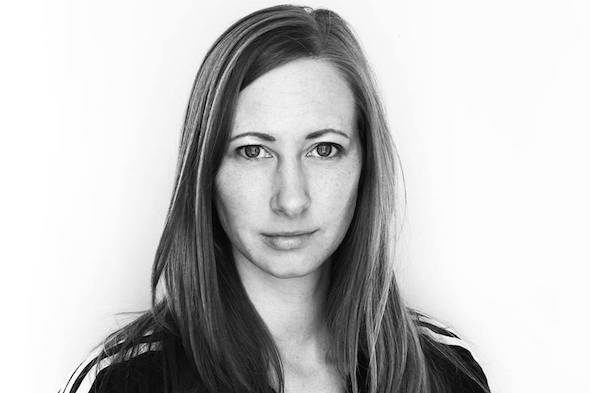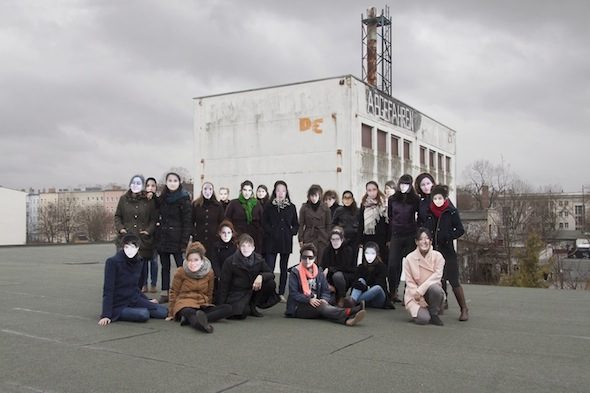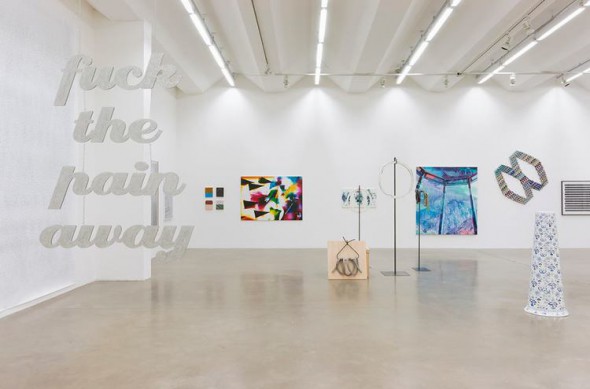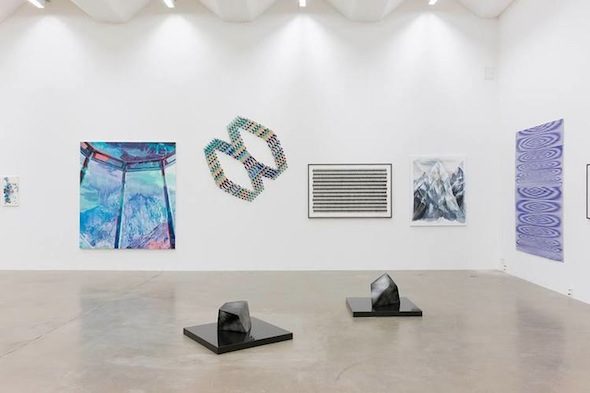In a world where women are constantly having to defend their position in the work place, curator and writer Tina Sauerländer provides a space in which women creatives can meet, discuss, collaborate, trust, and support one another without the pressures and constraints of society. Sauerländer is the founder of peer to space, a platform for artistic exchange, and Saloon, a network of women working in Berlin’s art scene as artists, curators, gallerists and journalists which Sauerländer runs together with Alina Heinze. Beginning with 10 members in 2012, Saloon now has 110 and is a steadily growing network that makes women’s voices heard in the art world and beyond. We sat down with Tina to discuss her curatorial work in light of this month’s topic, Art & Feminism.

Photo copyright Buero direkte Schoenheit
Nora Kovacs: Why did you feel it was important to create a women’s network like Saloon?
Tina Sauerländer: I think women are too reserved to build networks. We are anxious in many ways, for example when you read a job description. You need to meet certain requirements, like you ‘must be able to speak French’, or ‘speak English’, or ‘must want to travel’. Men are like “Yes! I want to travel, so this is the job for me. I can do it!” and women are like “Oh my god, is my French good enough? Am I sure I can do this?”. Women tend to question themselves much more and thus communicate differently.
NK: Why do you think that is? Why do women feel so self-conscious when it comes to putting themselves out there?
TS: Being a curator, lots of artists send me their work or add me on Facebook and most of them are actually men. So the other day I asked the ladies in Saloon, “Why don’t you send your portfolios to curators?”, and they said, “Well we don’t really dare to do it, because we don’t want to bother them with things they aren’t interested in.” Men seem to have much more self-confidence because we still live in a patriarchal society and have an androcentric world view, a man-made world. Men seem to have this idea that they can do everything so easily and women are never quite sure if they are good enough, which is obviously a really big issue and I think that is why it is important to have this network where we can build trust in ourselves, within the network, and within society.
 The 25 artists of SALOON on the roof of SEXAUER Gallery that participated in the first SALOON exhibition, May 2015; Photo © Ornella Fieres, Courtesy SEXAUER Gallery
The 25 artists of SALOON on the roof of SEXAUER Gallery that participated in the first SALOON exhibition, May 2015; Photo © Ornella Fieres, Courtesy SEXAUER Gallery
NK: How do you think this plays out in Berlin? Do women have a well established place in the art world here?
TS: I just read this post on Facebook by an artist – in New York, not in Berlin, but same idea – and she said that she doesn’t think about feminism in the studio, she thinks about feminism outside of the studio when she is trying to get her work shown. It is okay to be a woman in the art world these days, there are so many more opportunities than there were 50 years ago, but the struggle for visibility and accessibility is still there and every curator has to be aware of this and be careful to include those who are not always included.
NK: How do you think a group network, like peer to space or Saloon, can benefit artists and the work they make?
TS: Well, peer to space was founded on the idea of networking and bringing together artists to make group exhibitions, to provide input and space for them, while Saloon is a network especially for women working in the art scene. The members are always building new relationships, doing new projects together, giving each other recommendations, and all of it just happens through meeting every month. The network gives members a chance to become more visible, to build trust in one another, and to have people they can rely on.
 SALOON Exhibition View, 2015, works by Katharina Arndt, Nadine Fecht, Claudia Zweifel, Patricia Roeder, Gunna Schmidt, Lisa Tiemann, Michelle Jezierski, Maria Muñoz, Ina Sangenstedt, Anna Tsianou; Photo (c) Marcus Schneider, Courtesy of SEXAUER Gallery
SALOON Exhibition View, 2015, works by Katharina Arndt, Nadine Fecht, Claudia Zweifel, Patricia Roeder, Gunna Schmidt, Lisa Tiemann, Michelle Jezierski, Maria Muñoz, Ina Sangenstedt, Anna Tsianou; Photo (c) Marcus Schneider, Courtesy of SEXAUER Gallery
NK: In your curatorial statement you describe yourself as a “mediator between artistic expression and public perception”. Why do you feel this role is necessary?
TS: People have only their own two eyes through which to see the world. It is always going to be different if there is someone else to take a look and to apply another point of view that is not necessarily involved in the making of the artwork. That is the point of mediation; a curator filters between the artist and society and everything can come together or be communicated in a clearer way.
NK: So when you are curating, do you think of a concept first or do you look at artists/artworks and then formulate an overarching theme?
TS: It’s a mixture of both. I go to a lot of openings, visiting studios, I check the network, shows, websites, and then think about how various perspectives could be summarized under one subject or idea which I consider important for contemporary society. For example, for the show Dark Sides Of…, the subject was that there are two different ways of perceiving life, through dichotomies (black and white, good and bad) or through the Eastern/Buddhist idea that everything is connected and in a constant flow. I found these two perceptions in so many different artworks that I decided to invite those artists that seemed to exemplify them the most. What I do not do is choose a work that might fit in the show but does not actually have anything to do with the artist’s overall practice. It is about what the artist thinks in a broader sense, not just individual pieces.
 SALOON Exhibition View, 2015, works by Michelle Jezierski, Jennifer Oellerich (sculptures), Maria Muñoz, Anna Tsianou, Ce Jian, Caroline Kryzecki; Photo (c) Markus Schneider, Courtesy of SEXAUER Gallery
SALOON Exhibition View, 2015, works by Michelle Jezierski, Jennifer Oellerich (sculptures), Maria Muñoz, Anna Tsianou, Ce Jian, Caroline Kryzecki; Photo (c) Markus Schneider, Courtesy of SEXAUER Gallery
NK: Could you tell us about the Saloon meetings?
TS: The meetings’ structure comes from the name, “Saloon”, which merges the ideas of the 19th century “salons” in Paris and the Wild West “saloon”, where women could only enter as prostitutes. We combined these two male-dominated spaces with Saloon, which is, of course, an all-female network. We do studio visits, gallery and exhibition visits, we meet with curators, and afterwards we go out to dinner or grab drinks together, so there are two sides to Saloon.
NK: As a women’s network, are there certain subjects that you try to focus on during meetings and discussions?
TS: We don’t have any meetings distinctly pointing towards feminist topics, but as we are all women, we of course talk about our experiences with that. One thing for example which regularly comes up – even just last week, when I moderated a talk about love, sex and gender with artist Jonny Star – is the stress that men feel when we talk about feminism. It’s hard to explain why women are still not treated equally and why it’s important to talk about it. That’s why I often end up thinking it is more helpful to talk about art itself, not about feminism specifically, having the Saloon instead as a support.
NK: Can you imagine ever opening your network up to men as well?
TS: I never really thought about it actually (laughs). Yeah, maybe some aspects or events could be opened up, but it is really based on the idea that women need support. That is why the network is so important.


















